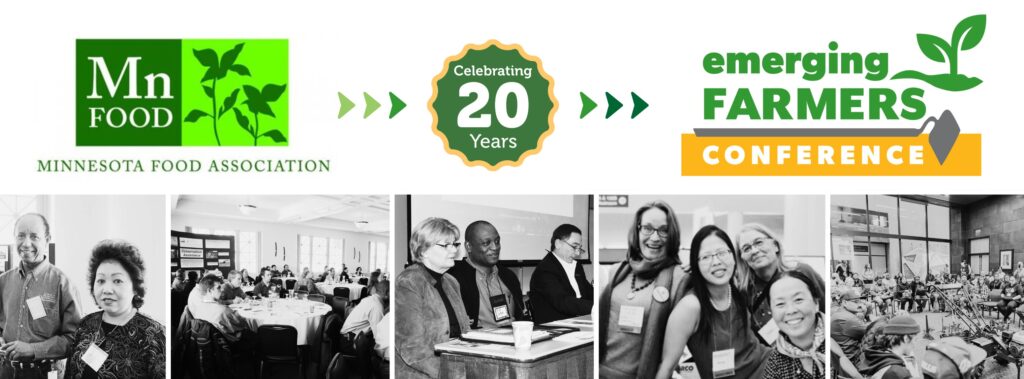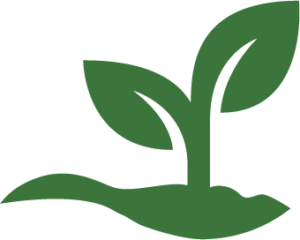History of The Emerging Farmers Conference

1970s – Early 2000s

In the 1970s, food activists fought to save the Saint Paul Farmer’s Market from urban renewal and The Minnesota Food Association (MFA) was born out of this effort.
Food cooperatives, farmers markets, and organic farming grew rapidly during this period and large numbers of immigrants came to Minnesota, including large numbers of Hmong people fleeing war-torn Southeast Asia. Many had farming experience but needed to learn how to farm in a new climate and culture. They were joined by other Southeast Asians, Africans, Latinos, and African Americans.
After years of providing training and technical assistance, the MFA and partners identified a need for land-based, hands-on experience. The original Twin Cities farm location where they provided this training was leased from Wilder Foundation in 2005. By 2007, MFA was distributing produce under the name Big River Farms.
2005 – 2010

Between 2005-2010, more agricultural agencies joined the effort to assist new immigrants and people of color in becoming farmers. These agencies partnered to organize expanded training sessions and field trips. Over time, these offerings grew into an annual event—the Immigrant and Minority Farmers Conference (IMFC).
Although the conference met a significant community need, it also faced financial challenges. By 2008, a global recession had hit the US and sponsor support shrank dramatically. Rapid conference growth coupled with higher costs made conference planning difficult.
2010 – 2015

More new immigrants, such as Bhutanese, Karen and Africans were entering the country with a desire to farm. At the same time, American farmers of color were also fighting for access and participation in an agricultural system built to benefit white farmers with large operations.
The IMFC Conference saw significant growth in attendance during this period, jumping from 40 attendees in 2001 to 170 in 2010. Farmers from other states began to travel to attend, and more agencies and experienced farmers of color became involved with conference planning. The conference also moved to a new location in Saint Paul.
2016 – 2018

The IMFC Conference drew more attention as the only farmers conference in the country designed for immigrant farmers and farmers of color. More farmers traveled from previously unreached states. Fifty percent of farmer attendees were Hmong alongside African American, Bhutanese, Burundi, Karen, Latinos, Lebanese, Native American and Nepalese farmers.
Conference organizers sought feedback on how to improve the conference, leading to greater emphasis on culturally relevant presentation strategies, ideas for specific interpreter training, and recommendations for greater accessibility. The conference grew increasingly popular during this period. There was a need for more support and infrastructure, so the conference became an MFA program.
2017 – 2019

The Minnesota Food Association (MFA) became a program of The Food Group in 2017. In 2019, the program began using the name Big River Farms for all farming work.
This was a time of change and transition for the conference. In response to farmer feedback, presentations incorporated principles of accessibility and cultural learning, such as activities, storytelling, discussion, and farmer-led skill demonstrations.
2017 brought a challenging political climate—which led to a dip in attendance and objections to the name of the conference. In 2018, the name was changed to the Emerging Farmers Conference (EFC). That year, farmer feedback was collected in an open forum, leading to a push to redesign and decolonize the conference starting with greater inclusion of farmers of color in planning and outreach.
2020-2024

In 2020, the conference made significant strides toward accessibility and inclusion. But there was still more work to do as attendees voiced concerns about inclusion and relevance for farmers of color. Rather than trying to fit into an oppressive food system, farmers envisioned a food system that worked for them. They wanted a conference model that addressed inequity and barriers for farmers or color and immigrants.
In 2021, the global COVID-19 pandemic limited in-person events, and the EFC Conference went virtual for the first time. Planning a virtual event was difficult, but it also brought new opportunities and reach with attendees from 25 states and 3 countries.
2020-2021 was a time of major change. Social inequities gained national attention, igniting a push for greater focus on equity and decolonization. In response, the committee sought outside support, organizing a facilitated retreat. They also hosted a listening session, where they received direct feedback from over 100 emerging farmers. This feedback led to clarified vision and strategies around equity, access, outreach, and sustainability.
In 2023, the planning process included our Farmer Advisory Committee, with emerging farmers and farmers of color shaping content and resources from the beginning. Other firsts included a wellness room and a farm business resource room to connect with lenders and government agencies. Attendees came from 14 states and two countries.
In 2024, we continued to emphasize diversity, farmer input, and practical skill building in conference planning and outreach. Building upon previous years, there was also a focus on how to get involved with public policy and ways to create change in the food system. 250 farmers came from 15 states. Seven languages were interpreted by 24 interpreters.